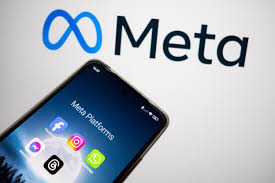The internet giant may be forced to separate Instagram and WhatsApp, businesses it acquired more than ten years ago and which have now developed into social media giants, as part of a landmark antitrust trial that starts Monday against Meta Platforms Inc.
The first significant test of President Donald Trump’s Federal Trade Commission’s capacity to take on Big Tech will be the impending antitrust trial.
In 2020, during Trump’s first administration, the case was brought against Meta, which was then known as Facebook.
It asserts that to stifle competition and create an unlawful monopoly in the social media industry, the firm purchased Instagram and WhatsApp.
As the world turned its focus from desktop computers to mobile devices, the FTC claims that Meta has maintained a monopoly by following CEO Mark Zuckerberg’s strategy, which he “expressed in 2008: ‘It is better to buy than compete.’
In keeping with that maxim, Facebook has systematically tracked potential rivals and acquired companies that it viewed as serious competitive threats.
Facebook also implemented policies set up to make it difficult for smaller rivals to enter the market and “neutralize perceived competitive threats,” according to the FTC’s complaint.
The FTC claims that Facebook’s executives “were unable to maintain its monopoly by fairly competing, so they addressed the existential threat by buying up new innovators that were succeeding where Facebook failed.”
In 2012, Facebook acquired Instagram, a scrappy photo-sharing app with no ads and a small cult following.
The $1 billion cash and stock purchase price was eye-popping at the time, but the deal’s value dropped to $750 million after Facebook’s stock price dropped after its initial public offering in May 2012.
The first business that Facebook acquired and continued to operate as a stand-alone app was Instagram.
Before that, Facebook was well-known for its smaller “acqui-hires,” a famous Silicon Valley practice where a business buys a startup to hire its skilled employees, then shuts down the acquired business.
It did it once more two years later when it paid $22 billion to acquire the messaging software WhatsApp.
As competitors like Snapchat (which it also attempted to acquire but was unsuccessful) and TikTok arose, WhatsApp and Instagram assisted Facebook in shifting its operations from desktop computers to mobile devices and maintaining its appeal among younger generations.
The FTC’s definition of Meta’s competitive market is limited, though, and does not include businesses like TikTok, YouTube, and Apple’s messaging service as competitors of Instagram and WhatsApp.
“Whether it’s looking at ten years ago, five years ago, or today, the FTC already has the difficult task of trying to define what the market we’re talking about is in a sufficiently narrow way that it can show Meta has a ton of power in that market,” stated Paul Swanson, an antitrust lawyer with Holland & Hart.
“And I do believe that challenge has become more difficult as the years have passed and we see an increasing number of potential competitors in social media spaces.”
The FTC’s case, however, “defies reality,” according to Meta.
The trial’s evidence will demonstrate what every 17-year-old worldwide is aware of: Chinese-owned TikTok, YouTube, X, iMessage, and many more are competitors of Instagram, Facebook, and WhatsApp.
The commission’s decision in this matter, which comes more than a decade after the FTC examined and approved our acquisitions, makes it obvious that no agreement is ever really complete.
The company said in a statement, instead of trying to dismantle a fantastic American firm and give China more advantages in important areas like artificial intelligence, regulators need to encourage American innovation.
The FTC “must prove that Meta has monopoly power in its claimed relevant market now, not at some time in the past,” Meta emphasized in a filing last week.
According to experts, this could also be difficult because, in the years since the business acquired Instagram and WhatsApp, additional competitors have entered the social media market.
U.S. District Judge James Boasberg will decide Meta’s destiny.
Late last year, Boasberg rejected Meta’s motion for a summary judgment and declared that the matter must proceed to trial.
According to Swanson, Boasberg “seems to be skeptical” of the FTC’s restrictive definition of a market in his decisions thus far.
According to him, the judge also stated that it is a “fact question,” meaning that he is receptive to the opinions of the FTC and its specialists over the definition of that specific market.
Laptops 1000The stakes are high for Meta, whose advertising income could be halved if it is forced to break off Instagram, even if the FTC may have a difficult time proving its case.
In the United States, Meta’s most lucrative market, Instagram is currently its greatest income generator, accounting for 50.5% of the company’s 2025 ad revenues.
Additionally, Instagram has long been making up for Facebook in terms of users, especially among youth, according to Emarketer analyst Jasmine Enberg.
In an attempt to attract Gen Z and younger users as they join social media, Meta is attempting to revive the original Facebook, which coincides with the trial.
Compared to 2012, when Facebook purchased Instagram, social media usage is much more dispersed today, and the trendy college students no longer hang out on Facebook.
Instagram must keep expanding for Meta, particularly as more advertisers prioritize Instagram with their Meta budgets.
However, Google and Amazon are also under investigation by federal antitrust authorities, so Meta is not the only digital giant in the spotlight.
On April 21, Google’s case is expected to enter the remedies phase.
Last August, a federal judge ruled that the search giant was an illegal monopoly.
Applying 19th-century rules to 21st-century markets is a major issue here.
And whether antitrust law’s judgment advances can keep up with evolving markets, particularly these dynamic and fluid digital markets, is, in my opinion, an open question,” Swanson stated. “And that will be directly addressed in this case.”

















